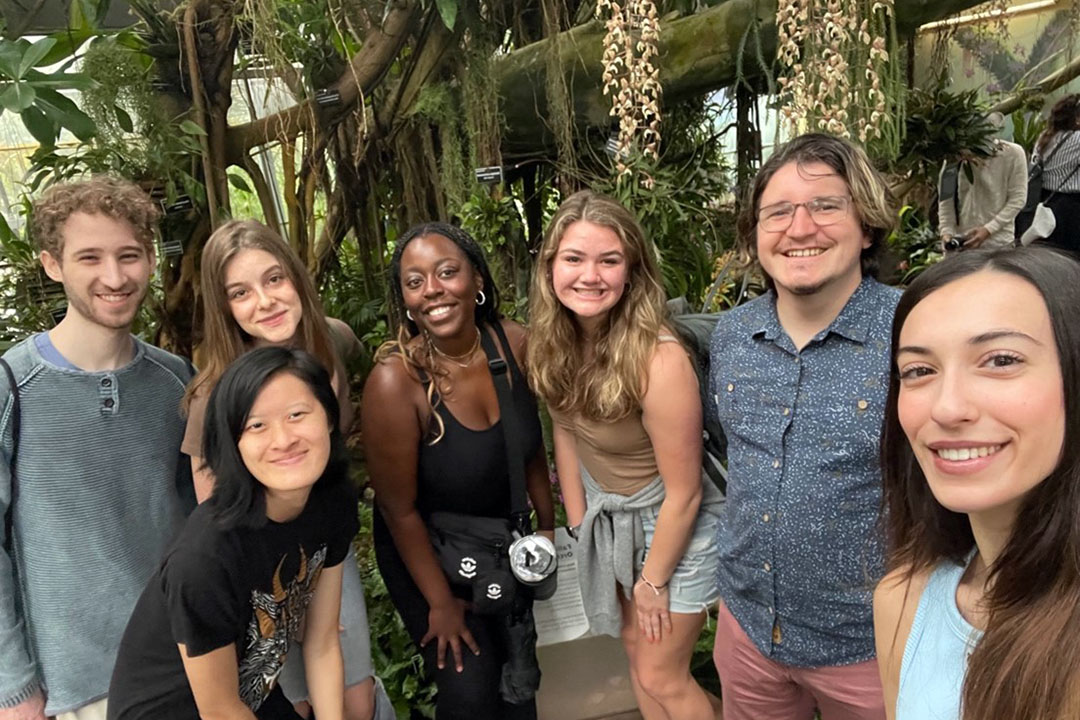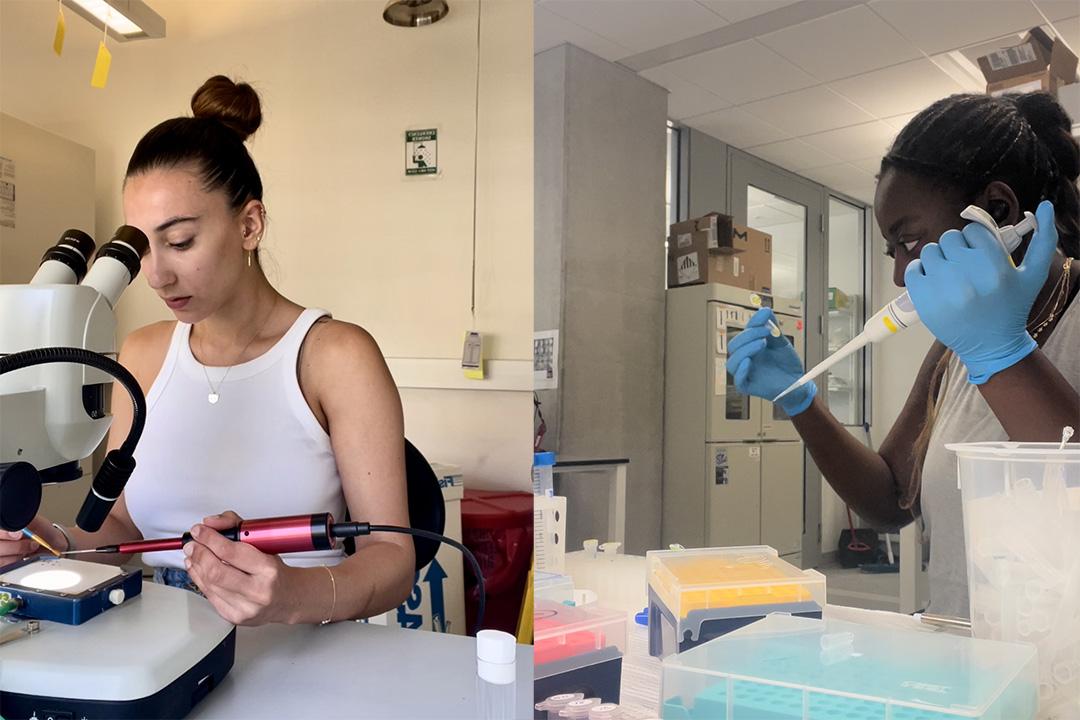Senior Maggie Connolly spent her summer on the Chesapeake Bay. But she wasn’t sailing or fishing for crabs. The biology major hiked through fields of swampy marshland along Virginia’s Eastern Shore, fighting off swarms of mosquitos in oppressive heat and humidity.
It’s not what most people would call a vacation. But Connolly was one of seven undergraduate biology and neuroscience majors who received a donor-funded Wilbur V. Harlan Undergraduate Research Fellowship. The merit-based scholarship enabled them to spend the summer on campus, conducting high-level independent research in faculty labs and field sites.
A research assistant with Associate Professor of Biology Keryn Gedan, whose work focuses on ecological threats to the bay, Connolly’s Harlan project involved collecting groundwater samples to gauge the effect of rising salt content on plant species. Amid the mud and bugs of the Brownsville, Va., tidal marshes, she quickly learned that the field is a different world from the lab.
“The amount of mosquitos was unlike anything I had ever experienced,” she said. “On my first field trip, I walked away with over 100 bites. They even bit through my clothes!”
Supported by the Wilbur V. Harlan Trust—a $9 million bequest from the estate of the late Wilbur V. (Bill) Harlan, BS ’35, a botany major who briefly served as a lab instructor at GW—the cohort of undergraduates were introduced to an intensive 14-week research experience, working closely with faculty mentors and graduate assistants on scientific projects of their own design.
In addition to 40-hours-a-week of field and lab research, they attended workshops and seminars on topics such as professional development and scientific techniques. They also visited scientists across the D.C. region, including at the National Arboretum and the Botanic Gardens. In October, the Harlan Fellows will present their research findings in a poster session before family, friends and faculty.
“These students have what it takes to be successful in a self-directed research experience and to continue a career in science,” said Associate Professor Damien O'Halloran, chair of the Department of Biological Sciences at the Columbian College of Arts and Sciences. “The Harlan Trust is truly playing a central role in training the next generation of young biologists.”
A Gamut of Research
Each Harlan student brought different biology backgrounds and research experiences to the fellowship this summer, noted Program Coordinator Nico MacDougall. Some were sophomores who had never stepped foot in a lab while others were veteran research assistants embarking on their senior thesis projects. “It’s a whole gamut of people. But what they have in common is their dedication and their interest in biology research,” MacDougall said. “Because they’re essentially signing up for a full-time job.”
After COVID curtailed an internship at the National Cancer Institute, sophomore Martina Tsimba wanted to make up for lost lab time as she prepares for a career in pediatric oncology. She considered working in a hospital, but was accepted into Associate Professor of Biology Arnaud Martin’s lab studying the genetics of butterfly wings. “In all honesty, I am not an insect person,” she laughed. “But I figured that of all insects, butterflies were the lesser evil.”
While she was initially intimidated by the high-tech lab—“I was afraid of breaking something,” she said—Martin and his graduate student researchers trained her on sophisticated equipment like the gene-editing tool CRISPR. For her Harlan project, Tsimba manipulated genes in butterfly eggs to understand how wing pigmentation influences sex selection. “I felt like I was thrown right into the day-to-day tasks of a researcher,” Tsimba said.
During her summer in Professor of Biology Ioannis Eleftherianos’ lab, senior Margarita Kyza-Karavioti learned challenging techniques—like injecting chemicals into millimeter-size fruit flies, a crucial step in her Harlan project on investigating immunity against the Zika virus.
And Connolly’s treks in the Chesapeake Bay enabled her “to get out in the field to see what our ecological research in coastal ecosystems is really all about,” said Gedan, who praised the Harlan Fellowship for “piquing a new researcher’s natural curiosity.”
Throughout the program, expert-led seminars and lectures offered training on cutting-edge techniques that department scholars use in their own research, O’Halloran said, from C.T. scanning and computer programming to 3D modeling of bones and tissues.
The program activities also gave the students an opportunity to bond over shared interests. Along with their independent work, many said they most enjoyed comparing notes with their cohort. “My favorite part of being a Harlan Fellow was the community,” Tsimba said. “I loved our weekly seminars and our lunches. I feel like I got the chance to really know the other fellows.”
For some students, O’Halloran said, the Harlan program can be a springboard for future research distinctions like the Luther Rice Undergraduate Research Fellowship. Meanwhile, many of the fellows planned to continue their summer projects into the fall semester. Connelly said she’s ready to venture back into the marsh—but this time with stronger bug spray. “I learned my lesson as the summer went on—and I learned a great deal about working as a field biologist, both independently and as part of a team,” she said. “The Harlan Fellowship provided me with opportunities and experiences that are hard to find anywhere else.”




